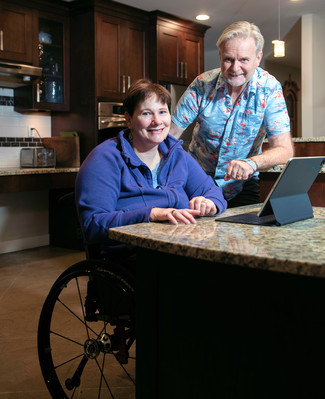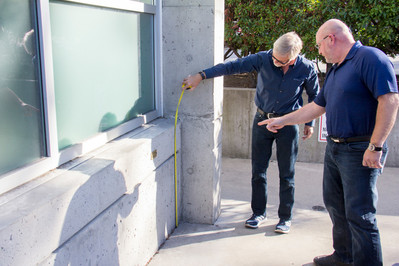 Can you share an interesting thing about your journey? I retired early and was looking for something meaningful to do. After I finished the VCC RHFAC Training, I was hired by the Rick Hansen Foundation (RHF) for an 18-month contract. When that ended, I thought I would rate sites for accessibility, creating my own company (which I did). However, I was asked to stay on with RHF full-time doing adjudication, public speaking and related RHFAC work. Now I am an Accessibility Certification Specialist at RHF, and one of the Adjudicators for the RHFAC program.
Can you share an interesting thing about your journey? I retired early and was looking for something meaningful to do. After I finished the VCC RHFAC Training, I was hired by the Rick Hansen Foundation (RHF) for an 18-month contract. When that ended, I thought I would rate sites for accessibility, creating my own company (which I did). However, I was asked to stay on with RHF full-time doing adjudication, public speaking and related RHFAC work. Now I am an Accessibility Certification Specialist at RHF, and one of the Adjudicators for the RHFAC program.
What sparked your desire to complete RHFAC Training? My wife Kim, who sustained spinal injuries, was at a peer coffee group when the RHFAC was discussed as an employment opportunity for people with disabilities and lived experience. People with disabilities have the highest rate of unemployment so it is a great opportunity. She thought I would be a good fit, as I am hard of hearing and acutely aware of the barriers in the built environment for people who have low vision, limited mobility and are hard of hearing/Deaf.
What was the best part about studying at VCC? The campus is conveniently located, adjacent to bus and Skytrain service. The building was easy to navigate, well illuminated, had accessible washrooms and elevators for every level.
What impact did your VCC teacher have on your career path? My instructor, Pat Short, is a certified adult educator. She recognized that I had the aptitude and ability to do this type of work. I required a bit of assistance when it came to tests and Pat was able accommodate me without compromising the course content. She is still a mentor to me and many others.
What would people be surprised to know about being an RHFAC Professional? Before becoming an RHFAC Professional, I thought I knew what accessibility meant because of my lived experience but the RHFAC Training has opened my eyes. As an RHFAC Professional, I am not only able to rate meaningful accessibility of buildings using RHFAC’s methodology, but have also increased my client’s knowledge and understanding of the accessibility of their buildings. It is not just about making improvements to the built environment but about changing people’s attitudes towards accessibility. This is what I value most.
 Who else do you think could benefit from taking RHFAC Training? Everyone involved in the built environment should take the RHFAC Training course, it will literally open your eyes to what accessibility and meaningful access means for people who are hard of hearing, deaf, blind, have low vision, combinations of Deaf and blind, and people who have mobility related disabilities. Architects, designers, or engineers will learn to incorporate accessibility and universal design principles into their projects.
Who else do you think could benefit from taking RHFAC Training? Everyone involved in the built environment should take the RHFAC Training course, it will literally open your eyes to what accessibility and meaningful access means for people who are hard of hearing, deaf, blind, have low vision, combinations of Deaf and blind, and people who have mobility related disabilities. Architects, designers, or engineers will learn to incorporate accessibility and universal design principles into their projects.
Why do you think this is important work? Consider that approximately 25% of the population has a disability. That number climbs to almost 50% when demographics such as hidden disability, age, and temporary disabilities are considered. Recently, my family had a group photo taken and out of the 6 people in the photo, 5 meet the criteria for disability. Making our built environment universally accessible is part of creating an inclusive world where everyone can live to their full potential.